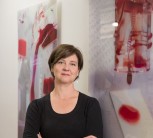The University of Pretoria (UP) has discovered new potent chemical compounds that show potential as candidates for both the treatment and elimination of malaria.
Professor Lyn-Marie Birkholtz, Professor in Biochemistry and South African Research Chair in Sustainable Malaria Control (part of the South African Research Chair Initiative, SARChI), was part of an international team that published this discovery in the journal Nature Communications on 11 January. “The breakthrough involves the identification of unique compounds that are able to kill several stages of the malaria-causing parasite and can block the transmission of the parasite between humans and mosquitoes,” she explained.
The deadly human malaria parasite Plasmodium falciparum occurs in South Africa. These parasites are transmitted to humans by female Anopheles mosquitoes. The only means of killing the parasite itself is to use chemical drugs, but new antimalarial drugs are urgently needed to address the growing concern of antimalarial drug resistance.
Prof Birkholtz describes the parasite as a “shape shifter” since it can take on multiple forms while in humans. Some of the forms cause disease and others allow the parasite to be transmitted back to mosquitoes to continue the life cycle. Prof Birkholtz states: “To eliminate malaria, it is essential that we have the necessary tools to kill all these different forms of the parasite. We can then cure patients of the disease but, importantly, also block the malaria transmission cycle. This is the only way to achieve malaria elimination.”
South Africa is leading regional malaria elimination efforts as part of four frontline countries in southern Africa including Namibia, Botswana and Eswatini.
In an innovative strategy, the team looked for new chemical compounds that can do exactly this, but that are completely new so that the parasite does not have resistance against them. The team runs a unique research platform on the African continent, in which all of these stages of the malaria parasite can be produced in the lab and be used to test chemical compounds. The team discovered compounds that kill the disease-causing form and compounds that blocked the parasite from infecting mosquitoes in the lab.
Two potent compounds target processes essential to the parasite’s survival: one is a clinical candidate against tuberculosis and blocks cell membrane synthesis and another is an anti-cancer candidate that targets epigenetic mechanisms (mechanisms that control cell fate beyond the genome). “This is the first time that these compounds were shown to have activity against malaria parasites and since they are not toxic to humans, they show the potential to be developed as antimalarials for both the treatment and elimination of the disease,” said Prof Birkholtz.
The discovery was made possible by the team’s use of an open-source chemical compound set called the Pandemic Response Box, developed by the Switzerland-based Medicines for Malaria Venture (MMV) and the Drugs for Neglected Diseases Initiative (DNDi). This compound box contains compounds that can be used for drug repurposing/repositioning, a process where drugs that have activity against a specific disease (e.g. cancer) can be reused for another disease (e.g. malaria). Dr James Duffy, MMV Project Director, describes the discovery “as an important breakthrough that emphasises the potential to use existing drugs as inspiration for drug discovery projects targeting different diseases. Never before has this been more important than in light of current outbreaks, where the rapid response to discover new chemicals able to kill infectious organisms is essential.”
Prof Birkholtz directs the parasite cluster of the UP Institute for Sustainable Malaria Control (ISMC), a multidisciplinary institute with a focus on integrated innovations towards malaria elimination in South Africa. Professor Tiaan de Jager, Director of the ISMC and Dean of Health Sciences at UP, said: “A discovery of this kind attests to the leading expertise in antimalarial drug discovery at UP, and in South Africa, addressing African-centred societal challenges. This work also shows the commitment of scientists at UP to contribute to the United Nation’s Sustainable Development Goal for Good Health and Wellbeing.”
Prof Birkholtz’s team led the transmission-blocking drug discovery effort as partner in the South African Malaria Drug Discovery Consortium (SAMDD) that includes two other South African Research Chairs, Professor Kelly Chibale (Chair in Drug Discovery at the Drug Discovery and Development Centre, H3D, at the University of Cape Town) and Professor Lizette Koekemoer (Chair in Medical Entomology at the WITS Institute for Research on Malaria at the University of the Witwatersrand) as well as scientists from the Council for Scientific and Industrial Research and international partners from the USA and Spain. The work has benefitted from sustained funding from the MMV and the Medical Research Council’s Strategic Health Innovation Programme (SHIP) and affirms that investments in health innovations places South Africa at the forefront of discovery.
Click on the video in the sidebar to learn more about malaria and this discovery.
Prof Lyn-Marie Birkholtz
January 11, 2021

 Story
Story
University of Pretoria (UP) researchers have found that the antioxidant content of certain types of tea can be likened to that found in recommended portions of fruit and vegetables.
 Infographic
Infographic
Half a cup of black tea, oolong tea or green tea contained the same amount of antioxidants with radical scavenging capabilities (RSC) as that of a 200mg vitamin C tablet.
 Story
Story
Researchers at the University of Pretoria (UP) may have identified the gene that is responsible for diet-related obesity. By exploring the role of the novel gene Slc7a8, they have made a potential breakthrough in current knowledge about the cellular mechanisms that drive fat accumulation. This understanding is crucial in developing effective treatments.
Copyright © University of Pretoria 2025. All rights reserved.
Get Social With Us
Download the UP Mobile App